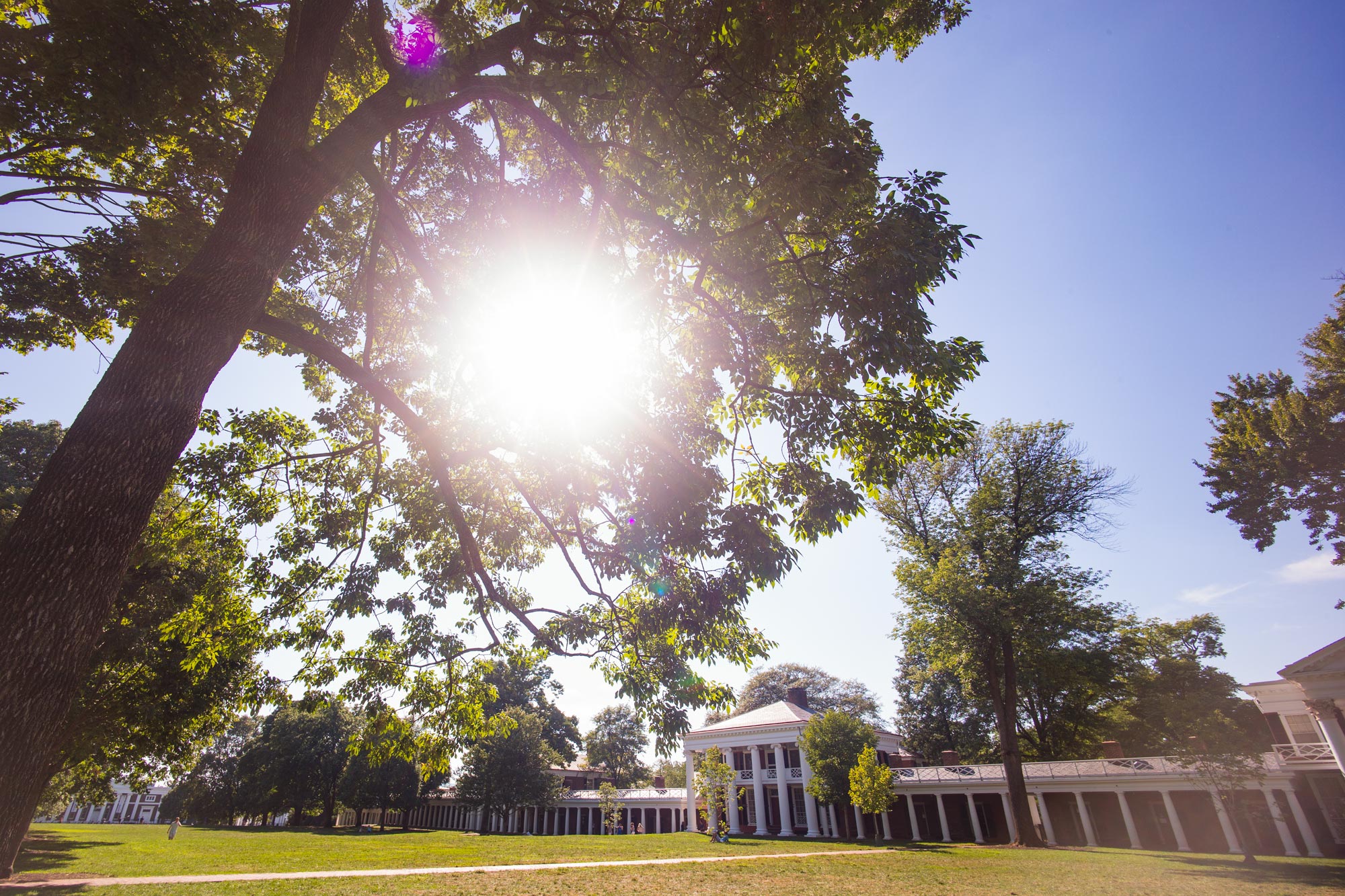The University of Virginia faculty members who recently received UVA’s Public Service Awards are “exemplars of what it means for a university to be both great and good,” said Louis Nelson, vice provost for academic outreach, borrowing the phrase President Jim Ryan uses to describe his initiatives for moving the University forward.
These faculty members conduct top-level research and teaching while simultaneously having a positive impact through thoughtful, committed partnerships in our community, Nelson said in a recent videoconference meeting. Three individuals received Excellence in Public Service Awards; two groups received awards for their collaborative work; one person was recognized for public interest research in particular; and another individual was honored with a new award given for the first time, the Jefferson Trust Award for Early Career Excellence in Community Engagement.
This year, the COVID-19 pandemic prevented the usual celebratory dinner for the All-University Teaching Awards, as well as the Faculty Public Service Awards. Faculty who were teaching community-based courses this semester had to decide how they and their students would finish the semester’s collaborative work with local partners.
Many of the recipients found out about their awards through the most common vehicle for conducting courses online: Nelson surprised them by dropping into their class meetings on the Zoom videonferencing platform to announce they had received the award and to sing their praises.
“The Public Service Awards have been a roadmap for us in this moment, during this local, and, of course, global crisis,” Nelson said. “How do we respond? Faculty who have been doing this work for a long time, whose excellence we are celebrating, have provided a roadmap for how we do this as an institution.”
Nelson said one mantra that has characterized the inclusion of local community members in coalitions and organizations has been “no research about us without us.”
These awards recognize and acknowledge faculty members who are involved in sustained community partnerships, who offer their students opportunities to join with them and their neighbors in working together to make this a better place to live.
Jefferson Trust Award for Early Career Excellence in Community Engagement
Barbara Brown Wilson, assistant professor of urban and environmental planning in the School of Architecture
“Wilson exemplifies the characteristics, talents, and skills that embody community-engaged academics. She is a model for what the University should be aspiring to in all its community-engaged work,” wrote UVA Law professor Dayna Bowen Matthew, who nominated Wilson.
Matthew said she and Wilson became colleagues when working to co-found the UVA Democracy Initiative’s Center for the Redress of Inequity through Community Engaged Scholarship, known as “The Equity Center.” Matthew serves as Equity Center faculty director, and Wilson now directs the center’s “Democratization of Data Initiative.”
Wilson advocated for a pan-University institute like the Equity Center, and drew from her considerable knowledge of community-engaged scholarship to co-write a proposal that faculty from 18 departments saw as worthy of support.
“In her five years at UVA, Wilson has crafted influential new courses that change the way we teach community engagement and conduct community-engaged scholarship at the University,” Matthew wrote, saying Wilson played pivotal leadership roles in several efforts.
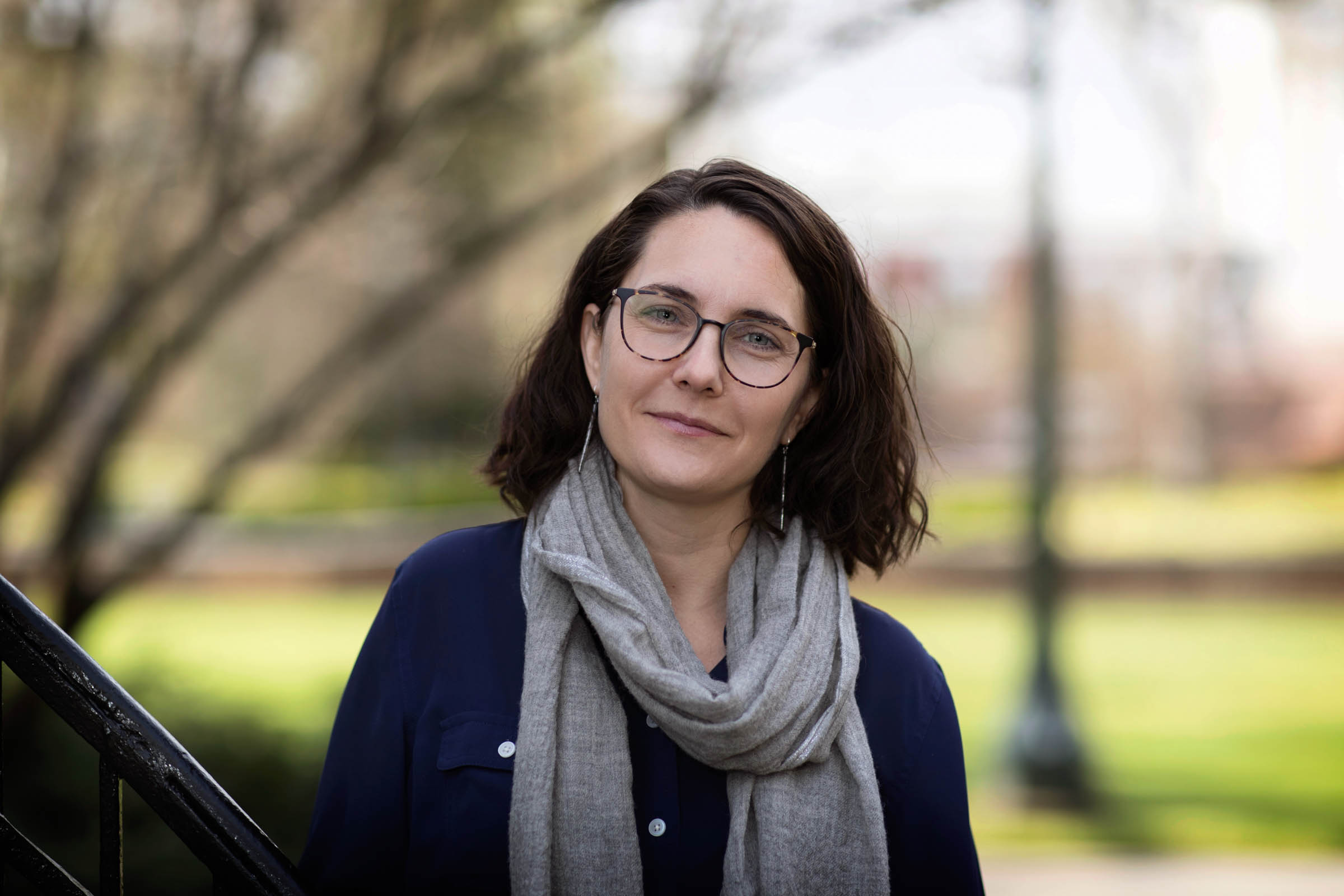
Barbara Wilson’s action-oriented research is changing affordable housing redevelopment to community-driven design processes. (Photo by Dan Addison, University Communications)
One project involved a youth-driven courtyard redesign at Friendship Court, meant to model design concepts for future redevelopment while improving the courtyard today. The project was a collaboration with Youth Leaders living at Friendship Court, Piedmont Housing Alliance, Alex Gilliam of Public Workshop (a 1997 architecture alumnus) and the UVA School of Architecture, with construction supported by the UVA Facilities Apprenticeship Program.
Wilson’s students in her “Methods of Community Engagement and Research” course contribute to “meaningful, mutually beneficial community-driven partnerships sustained long-term through the UVA Equity Center,” Wilson wrote in an email. Together, they “figured out a way to make it a beneficial part of our quarantine community-making efforts, in addition to continuing the learning,” Wilson wrote.
“This semester we worked with Siri Russell of Albemarle County’s Office of Equity and Inclusion, Jordy Yager at the Jefferson School African American Heritage Center, and Sarah Hanks at the Monticello Area Community Action Agency – and the student groups had solid plans underway for their partnerships before spring break. Once we transitioned online, I asked the groups to look back at their [Memoranda of Understanding] and amend any scopes of work based on pandemic-imposed limitations, and they all proposed great solutions to ensure the work was still meaningful for all involved.”
The students presented their final projects to their partners via Zoom in the last class Tuesday, Wilson said, and they will load their reports online through the University Library’s LibraOpen portal “to ensure the work is permanently and dependably accessible to our community partners.”
Matthew said, “The extent to which Barbara has earned the esteem of her faculty colleagues is only exceeded by the trust she has built among students and members of the local community.”
Excellence in Public Service: Individual
• Gregory Fairchild, Isadore Horween Research Associate Professor of Business Administration, Darden School of Business
At first, Darden professor Greg Fairchild didn’t know how to respond to a letter from a prisoner asking for help in changing his life so he could stay out of prison and become a better job applicant. That was almost 10 years ago.
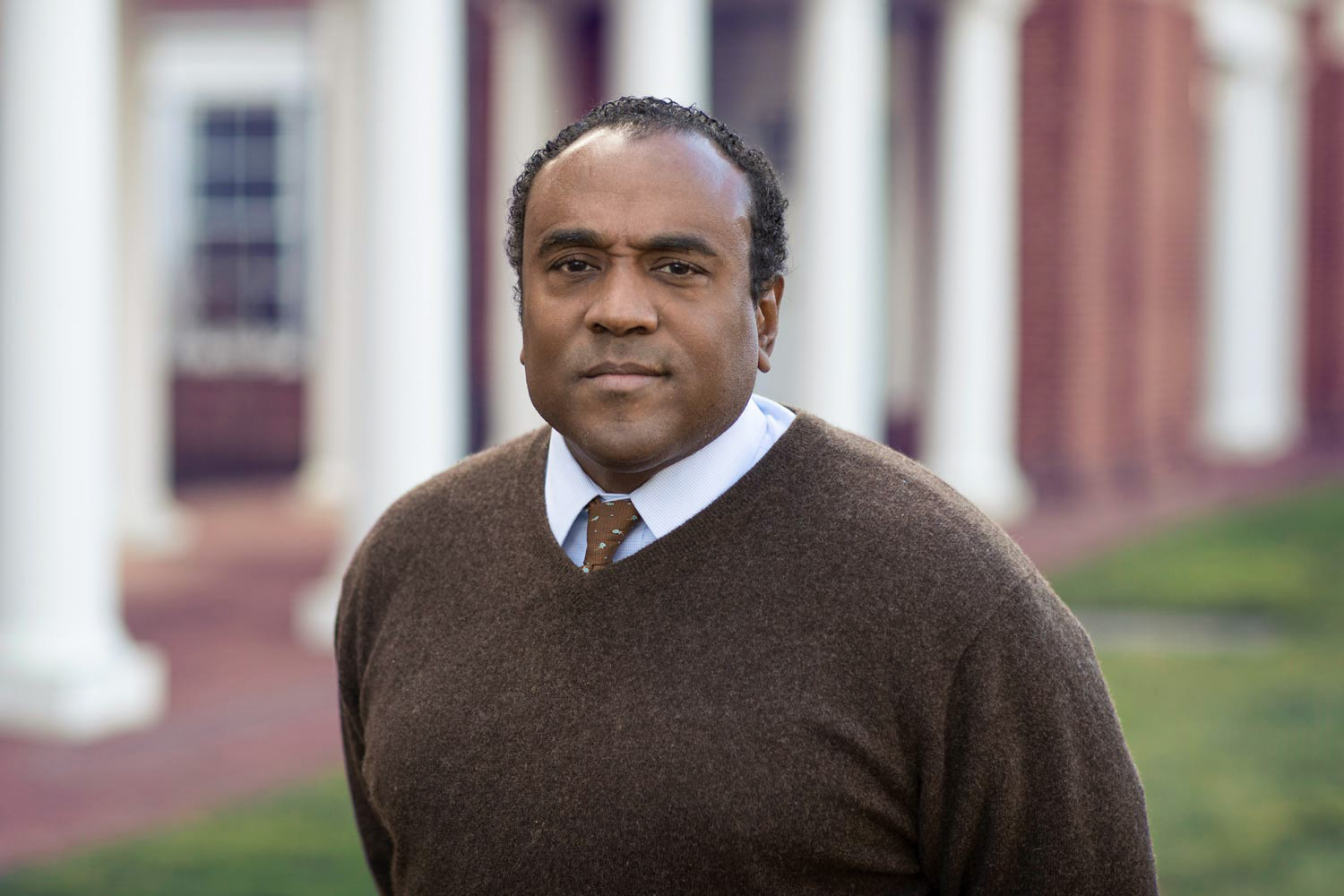
Greg Fairchild developed an education program to help incarcerated individuals get better prepared to return to society and join the workforce. (Photo by Dan Addison, University Communications)
Fairchild soon started what became the Resilience Education program to tackle problems recently incarcerated individuals often face as they try to reenter society. He partnered with the Virginia Department of Corrections to offer business-related courses and critical job readiness skills to help them build the confidence and capacity to move their lives in a positive direction after release.
The Darden prisoner reentry program has graduated more than 400 returning citizens, reduced the recidivism rate for those who go through the program to 7% (from Virginia’s overall rate of 23%), and distributed more than 750 certificates across three curricula. More than 250 M.B.A. student volunteers, plus a cadre of faculty instructors, teach in three Virginia correctional facilities.
The program also has become a cross-Grounds enterprise, with participation from Ph.D. students in the Curry School of Education and Human Development, UVA Law students and undergraduate interns.
Since Fairchild and his wife, Tierney (an alumna of the Curry School and Darden), founded Resilience Education as a nonprofit organization, its concept and curriculum have been expanded to other academic institutions. Columbia University now offers courses at New York’s Sing Sing Correctional Facility, and programs are in the works in other states. Fairchild said, “I am increasingly asked to speak on our work at academic and non-academic gatherings, which has only increased interests in others becoming involved.”
• Dr. Mohan “Mo” Nadkarni, professor of medicine
Nadkarni co-founded the Charlottesville Free Clinic in 1992 that has provided health care to more than 25,000 uninsured and working people, and he has helped develop other outreach programs to aid underserved and vulnerable local populations.
“These programs have been sustainable and led to demonstrable results to improve the lives of our community,” wrote Dr. Mitchell Rosner, who chairs the Department of Medicine and nominated Nadkarni. “In addition, Mo has served as a mentor, role model and educator to show all of us how to engage in public service,” he said.
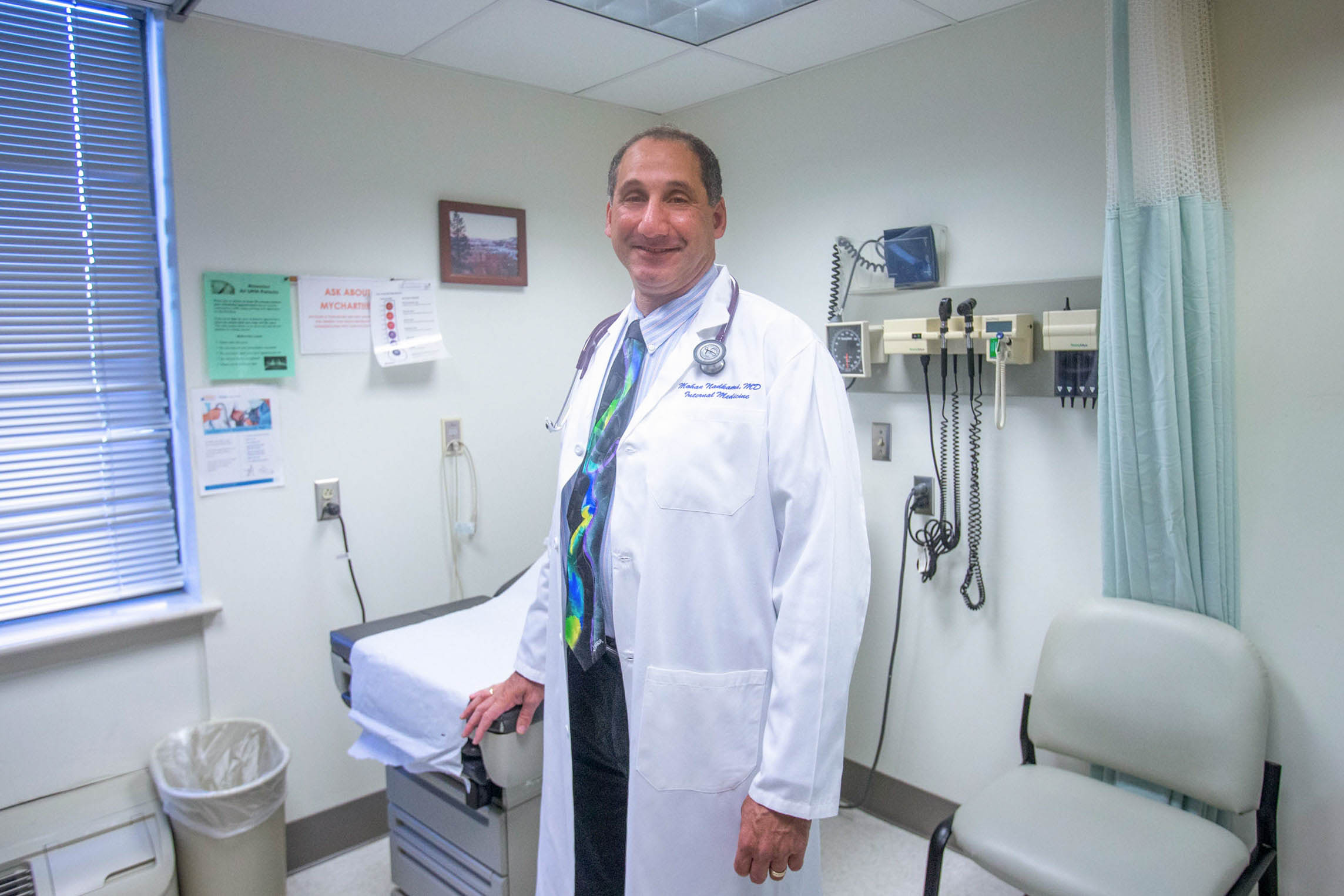
Dr. Mohan Nadkarni helped start the Charlottesville Free Clinic in 1992. (Photo by Sanjay Suchak, University Communications)
Nadkarni created a course, “Social Issues in Medicine,” which enlists about 160 first-year medical students each year to participate in community service, working with almost 30 local agencies, including the Charlottesville Free Clinic, Shelter for Help in Emergency, Boys and Girls Clubs, and senior centers, among others, as the future physicians learn about the social determinants of health.
Since the pandemic hit, the students’ in-person activities had to be canceled, but if they could be moved online, they were continued that way, Nadkarni said.
Nadkarni wears several different hats in the School of Medicine and UVA Health, also working with medical residents and as an attending physician for patients. He and his colleagues are conducting as many telehealth video visits as they can, he said.
“The pandemic is showing holes in the health system for underserved and vulnerable communities,” Nadkarni said. It’s putting a magnifying glass on disparities, with African Americans having higher rates of infection. He and others are working to close the gaps as the quarantine continues.
• Richard Westphal, the Woodard Clinical professor of Nursing and psychiatric nurse practitioner
Shortly after the deadly Unite the Rally rocked the greater Charlottesville community in August 2017, one of the first phone calls Fire Chief Andrew Baxter, a 1994 Nursing School alumnus, made was to professor Richard Westphal.
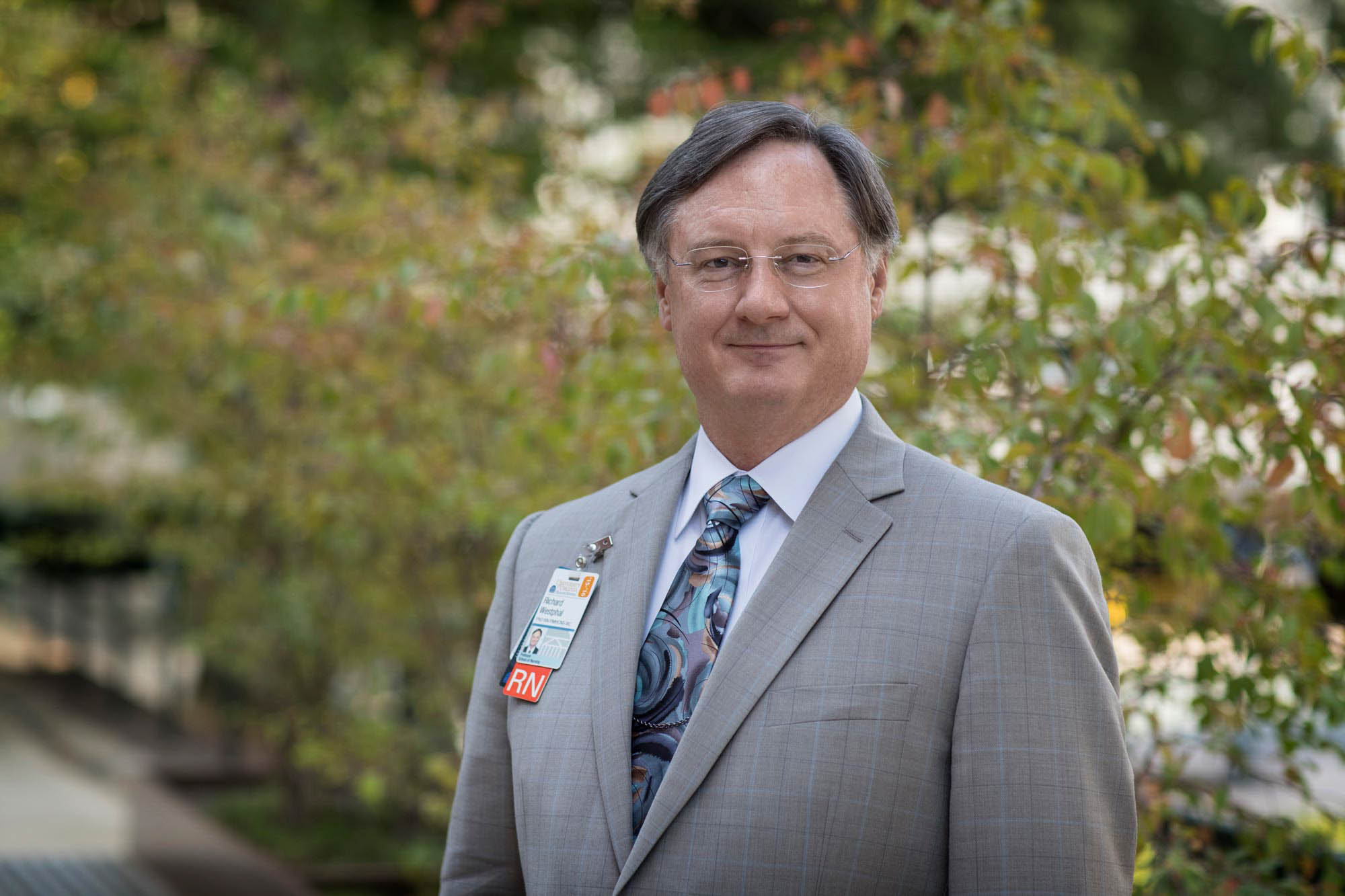
With his Stress First Aid program, Richard Westphal emphasizes the importance of health care workers maintaining good mental health. (Photo by Dan Addison, University Communications)
Baxter, one of the professor’s nominators for a Public Service Award, called Westphal instrumental in laying the groundwork after those events “in what I believe to be one of the most important achievements in my almost 30 years in the fire service: taking care of my firefighters after they experienced a level of violence rarely encountered by local responders.”
Westphal, who once headed the Navy’s $117 million psychological services and traumatic brain injury programs, helped develop the Stress First Aid program, a color-coded mental health approach to dealing with stress injuries experienced by frontline clinicians, public safety professionals and emergency responders. Such stress injuries dramatically alter health care providers’ ability to live, work and cope, and certainly affect the quality and safety of their work.
Westphal, who earned a Ph.D. from the Nursing School in 2004 and currently chairs the school’s Department of Family, Community, and Mental Health Systems, has described his work as focused on three domains: mental health promotion, stigma reduction and occupational stress interventions.
For the past 13 years, he has offered his stress first aid course to hundreds of firefighters, military personnel, police officers, nurses, physicians and many others. Grounding that work, wrote Westphal’s nominators, is his fierce commitment to collaboration, wise counsel and ability to “both in and out of uniform, impact multiple careers and tens of thousands of lives.”
– Christine Phelan Kueter
Excellence in Public Interest Research
Christine Mahoney, Professor of Public Policy and Politics, Frank Batten School of Leadership and Public Policy
Mahoney, founding director of the Social Entrepreneurship at UVA initiative, measures the value of her work by its impact on real-world solutions to local and global challenges, said her nominators.
In its eighth year now, the Social Entrepreneurship at UVA program enrolls hundreds of students annually and has incubated dozens of local social enterprises devoted to public interest work. Ashoka, a global leader in social innovation education, recently named the program a worldwide winner of AshokaU’s #MillionsofChangemakers, an award recognizing institutions of higher education that are empowering students to transform society in ways that benefit everyone.
Mahoney’s research focuses on global advocacy on behalf of the displaced – studying how nongovernmental organizations and governments at the local, national and global levels attempt to fight for the rights of those who have been forced to flee their homelands due to ethnic and political violence.
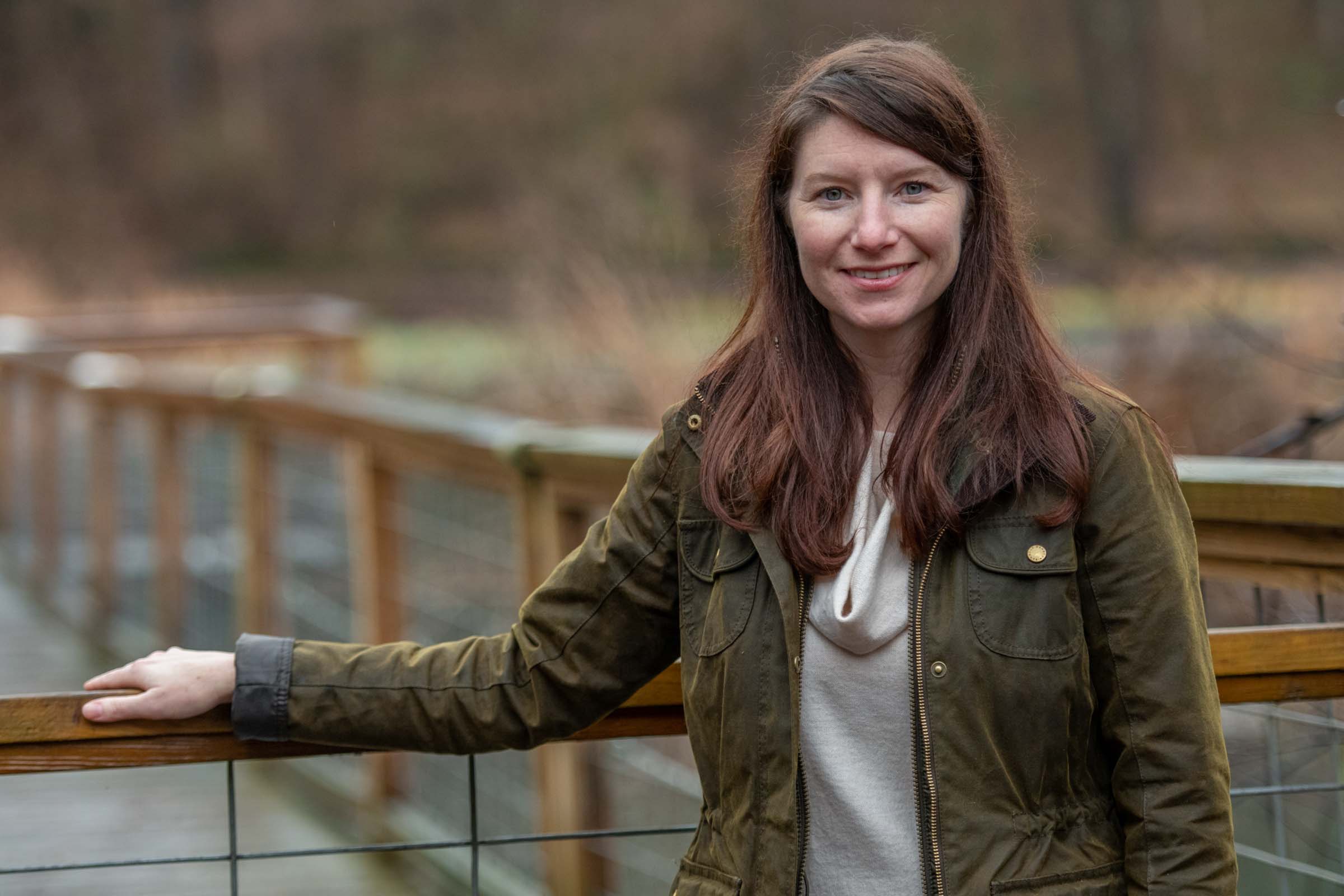
Christine Mahoney devotes her academic work and social entrepreneurship to involve community engagement in finding solutions to local and global public policy issues. (Photo by Earl Neikirk)
More recently, Mahoney has begun community public interest engagement in the Charlottesville area. She is working with the New Hill Development Corporation to assist in ending racial disparities by expanding and strengthening greater Charlottesville’s African American middle class. The goal is to rebuild wealth lost though the destruction of the once-vibrant Vinegar Hill neighborhood during a 1960s-era “urban renewal” initiative.
Her “Experience Social Entrepreneurship” capstone course engages students in the challenges faced by mission-oriented startup ventures, whether based in Charlottesville or elsewhere. Her more recent field study, to Appalachia, provided students with a line of sight into the struggles faced by rural America and the role impact capital could play in overcoming these struggles.
“At a time when our species and planet face extinction-level threats, I feel that we must ask if we are moving the needle on real-world solutions,” Mahoney wrote about why her academic work focuses on public engagement.
“In my career I have found public interest research as the most important calling. It is critical to work with communities of practitioners to know which research questions are worth asking, use research methods that gather the information communities actually need, and to walk hand-in-hand with communities as they seek to implement what we collectively come to consider ‘best practices.’”
Excellence in Public Service: Collaborative
David Edmunds, associate professor, Global Studies; Laura Goldblatt, general faculty, Global Studies & Engagement Program; associate professor Rupa Valdez, Global Public Health, Public Health Sciences, Engineering
Rupa Valdez and David Edmunds began visiting the Westhaven Clinic in the Westhaven public housing site about five years ago, to learn about the clinic’s work and to explore possibilities for collaboration. They started talking with members of the Public Housing Association of Residents, who wanted to guide the research process that looked at low-income housing toward issues they felt were important, and away from research that they felt stigmatized them, misrepresented their lives and their issues, or simply advanced an academic career while bringing no tangible benefits to their communities.
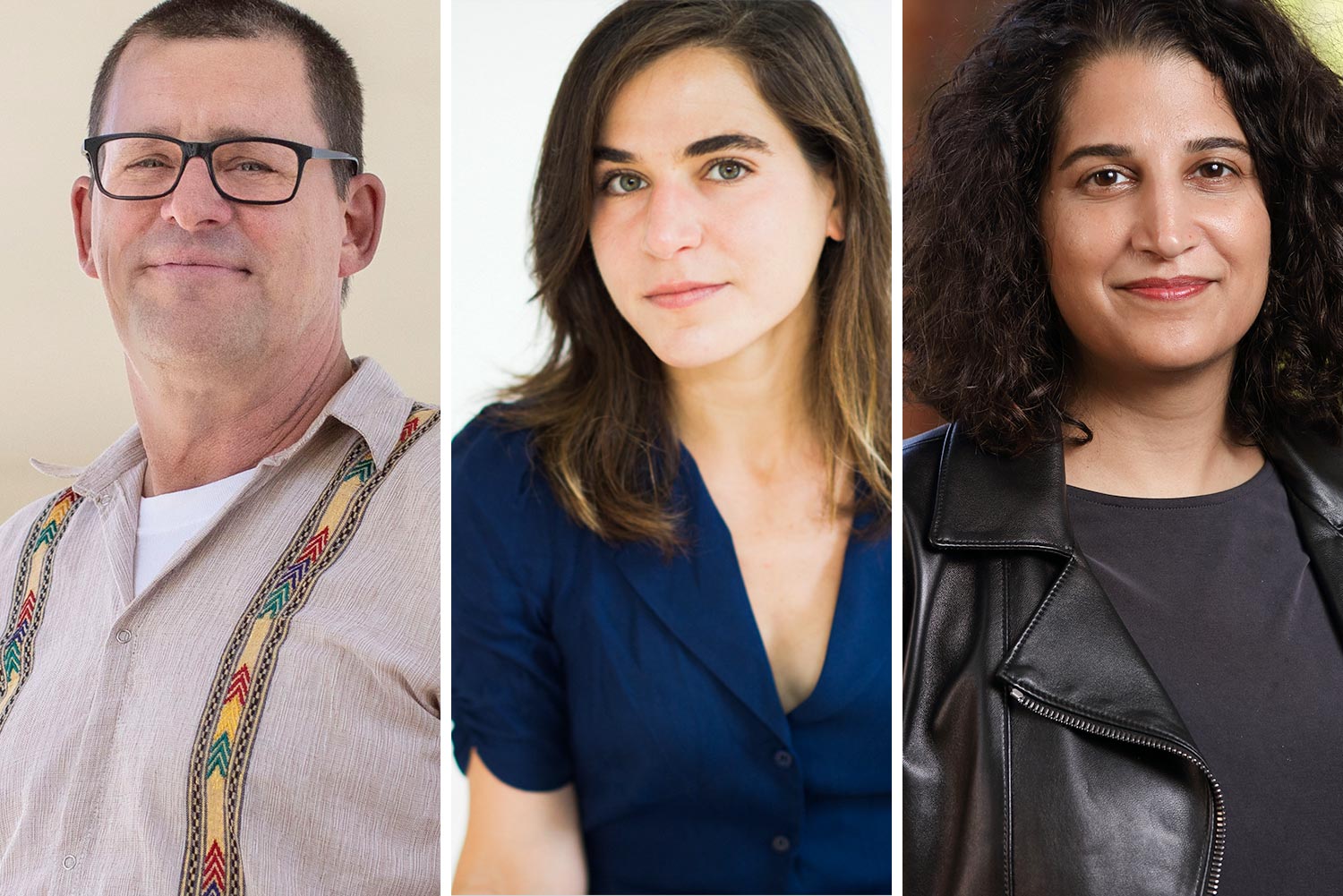
David Edmunds, Laura Goldblatt and Rupa Valdez teamed up with the Westhaven neighborhood group to develop research that will benefit residents. (Photo of Edmund by Sanjay Suchak; Goldblatt, contributed photo; and Valdez by Tom Cogill)
The group began to envision a relationship where they share in ownership of data and data analysis, thereby allowing all stakeholders to participate in creating the narratives emerging from research.
At that point, Laura Goldblatt joined them, bringing with her an established network within the housing advocacy community in Charlottesville, and insights regarding the role that the humanities could play in such engagements.
Edmunds pointed out that everyone involved keeps learning, including participating students who “learn to respect the theoretical and practical knowledge held by those outside of the University because they depend on it, often heavily, in whatever shared project they undertake. They learn about their own ethics and commitments, too – how far they are willing to push themselves, and in what ways.”
“Over the years of our partnership,” Valdez wrote in a personal statement about her public service, “we have engaged in ongoing dialogue that has shaped the projects we pursue together and the way we involve our students. Our original group discussions led to a series of projects focused on designing ways to support women in the Westhaven community with chronic disease management. Over time, conversations related to what we had learned from that collaboration merged with other discussions happening internally [and with] PHAR.”
Most recently, creating a Community Research Review Board became their next collaborative endeavor and top priority. Through this initiative, the University and community partners continue to clarify their participation in collaborative research projects, focusing on the perspectives of Charlottesville residents, especially low-income or disadvantaged residents, when determining what types of research and projects take place in their communities.
The University’s new Equity Center provided seed funding for the development of this Community Research Review Board.
Craig Volden, professor of public policy and politics, Frank Batten School of Leadership and Public Policy, with Alan Wiseman of Vanderbilt University
Volden’s Public Service Award recognizes his research with Alan Wiseman of Vanderbilt University on rating the effectiveness of Congress members based on how and what the members voted for. After several years of research, they published a well-received book, “Legislative Effectiveness in the United States Congress,” in 2014.
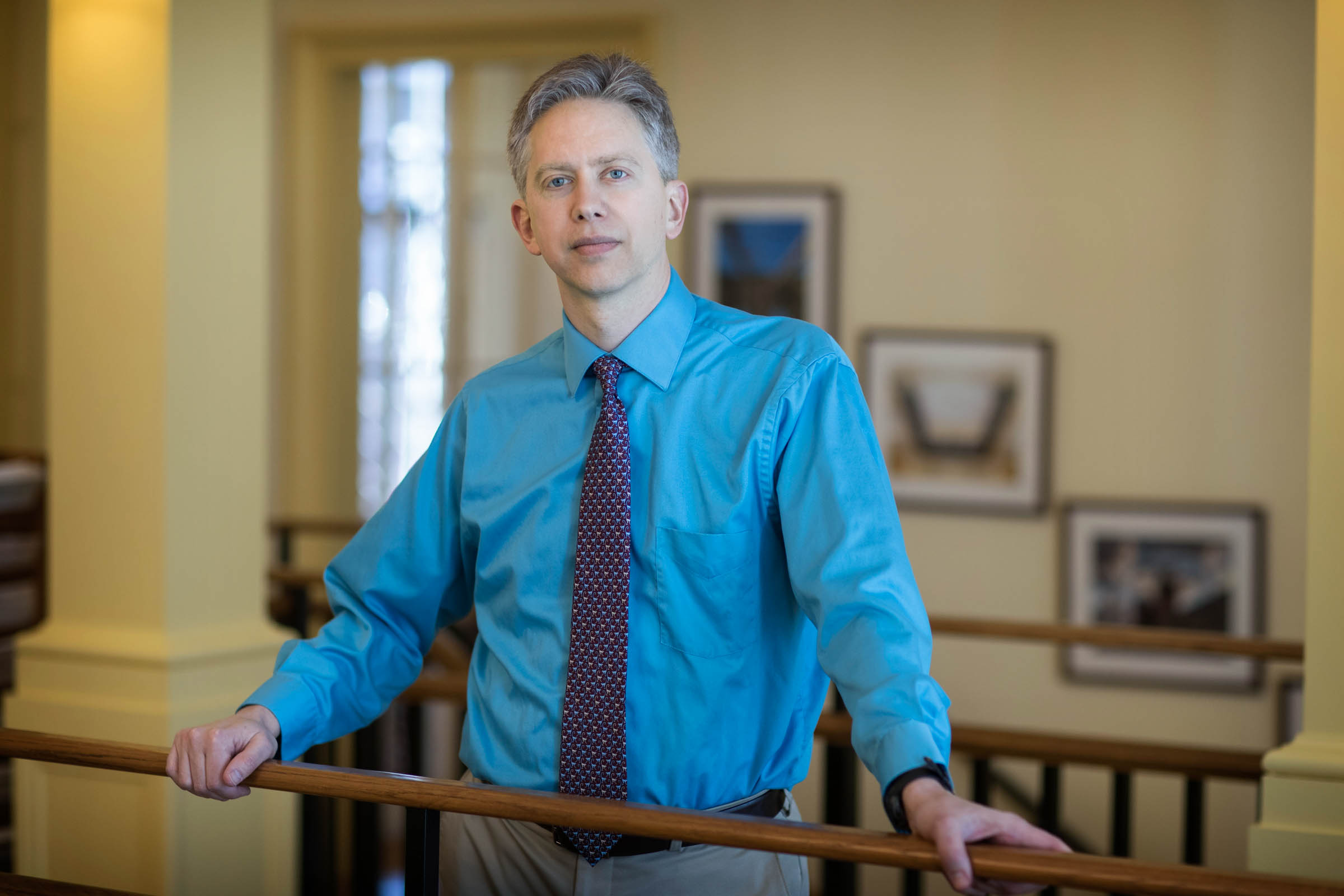
Craig Volden and his colleague Alan Wiseman at Vanderbilt keep track of the law-making work of legislators. (Photo by Dan Addison, University Communications)
Receiving support from their home institutions and private funding, Voldman and Wiseman co-founded the Center for Effective Lawmaking in 2017, with a mission “to advance the generation, communication, and use of new knowledge about the effectiveness of individual lawmakers and legislative institutions.”
The researchers generate “Legislative Effectiveness Scores” for each member of the U.S. House and Senate, starting from 1973 through the present. These scores combine 15 metrics that capture the number of bills that each lawmaker sponsors, how far they move through the lawmaking process and how important their proposals are.
The focus of much of their recent work has been on what they call the “Building a Better Congress Project.” The professors took their project into the classroom, involving undergraduate students as well as the graduate students working with them.
This project has three parts: identifying the characteristics of those who would likely be highly effective lawmakers, if they were to run for Congress and be elected; the cultivation of activities by lawmakers, and of institutional reforms for Congress as a whole, that encourage effective lawmaking; and the potential for accountability based on legislative effectiveness that is necessary to provide the proper incentives for advancing a highly functioning American democracy.
The pair also has created a checklist and advised new members of Congress and potential candidates, based on their continuing research.
“In times when American democracy is facing difficult challenges and when Congress is held in extremely low public regard,” Volden wrote in a personal statement about public service, “we are pleased to be able to provide the service of helping to build a better Congress – and especially to base our advice and support on sound scholarship in collaboration with so many students, faculty, staff, and partners for good governance.”
Media Contact
Article Information
May 5, 2020
/content/making-commitments-and-creating-trust-are-hallmarks-faculty-public-service

